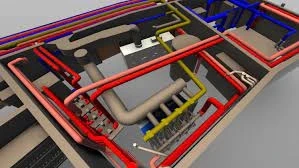In the realm of modern construction and infrastructure development, Building Information Modeling (BIM) has emerged as a transformative technology, reshaping project delivery processes and enhancing collaboration among stakeholders. BIM implementation services play a pivotal role in this paradigm shift, facilitating the adoption and utilization of BIM across the industry. This blog explores the significance of BIM implementation services, their impact on project outcomes, and the evolving landscape of construction management.
Understanding BIM Implementation Services
BIM implementation services encompass a range of consultancy, training, and technical support offerings aimed at integrating BIM workflows into construction projects. These services are provided by specialized firms or consultants with expertise in BIM software and methodologies. The primary objective is to assist organizations in leveraging BIM effectively to optimize project efficiency, reduce costs, and improve overall project outcomes.
Key Components of BIM Implementation Services
Strategic Planning: BIM implementation begins with strategic planning tailored to the specific needs of the organization. This involves assessing current workflows, defining project goals, and outlining the roadmap for BIM adoption.
Training and Education
One of the critical aspects of BIM implementation is workforce training. BIM service providers conduct workshops and training sessions to upskill architects, engineers, and project managers on BIM software tools and best practices.
Software Integration
BIM implementation services include configuring and integrating BIM software into existing workflows, ensuring seamless data exchange and collaboration across project teams.
Standards Compliance
Adhering to industry standards and protocols (e.g., ISO 19650) is essential for successful BIM implementation. Service providers ensure compliance with these standards to enable interoperability and data consistency.
Technical Support and Maintenance
BIM service providers offer ongoing technical support and maintenance to troubleshoot issues and optimize BIM workflows throughout the project lifecycle.
Advantages of BIM Implementation Services
The adoption of BIM implementation services offers several compelling advantages that impact project delivery and overall construction management.
Enhanced Collaboration and Coordination
BIM fosters improved collaboration among multidisciplinary teams by providing a centralized platform for sharing project data. Implementation services facilitate smoother coordination between architects, engineers, contractors, and other stakeholders, leading to fewer errors and clashes during design and construction phases.
Improved Project Visualization and Simulation
BIM enables stakeholders to visualize projects in 3D and simulate various scenarios, allowing for better decision-making and risk management. BIM implementation services empower teams to leverage these capabilities effectively, resulting in optimized designs and construction sequences.
Increased Cost and Time Efficiency
By streamlining workflows and enabling real-time project monitoring, BIM implementation services contribute to cost and time savings. Improved efficiency in design iterations, clash detection, and quantity take-offs reduces project delays and budget overruns.
Quality and Sustainability Enhancement
BIM facilitates the integration of sustainability factors into project design and construction. Implementation services emphasize the use of BIM for energy analysis, lifecycle assessments, and material sourcing, supporting the development of more sustainable built environments.
Regulatory Compliance and Risk Mitigation
BIM implementation services ensure compliance with regulatory requirements and industry standards, minimizing legal and regulatory risks associated with construction projects. This comprehensive approach enhances project transparency and accountability.
The Evolving Landscape of Construction Management
BIM implementation services are driving a fundamental shift in construction management practices, influencing industry trends and methodologies.
Rise of Integrated Project Delivery
BIM supports the principles of Integrated Project Delivery (IPD) by promoting collaboration and early involvement of all stakeholders. Implementation services align with IPD strategies, fostering a more integrated and cohesive project delivery approach.
Adoption of Cloud-Based BIM Solutions
Cloud-based BIM platforms are gaining traction, enabling real-time collaboration and remote access to project data. BIM implementation services facilitate the deployment and management of cloud-based solutions, enhancing accessibility and scalability.
Emphasis on Digital Twin Technology
BIM serves as the foundation for Digital Twin technology, which enables real-time monitoring and management of built assets. Implementation services are instrumental in harnessing BIM data for creating and maintaining digital twins throughout a building's lifecycle.
Conclusion
BIM implementation services are instrumental in transforming project delivery within the construction industry. By providing tailored strategies, training, and technical support, these services empower organizations to harness the full potential of BIM for improved collaboration, efficiency, and project outcomes. As the construction landscape continues to evolve, BIM implementation services will remain indispensable for organizations seeking to stay competitive and deliver innovative and sustainable built environments.



